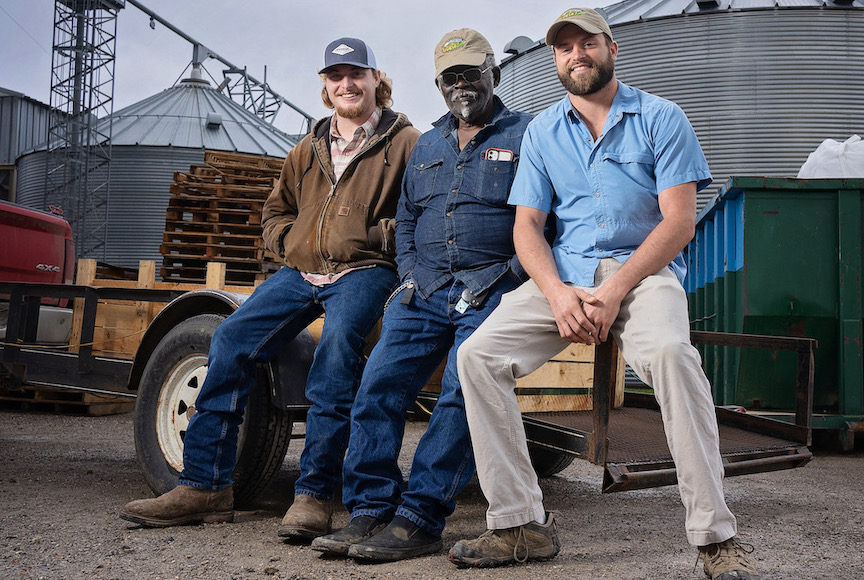Visionary Farmer Shatters Agriculture’s Conventional Rules, Forges Chain of Success
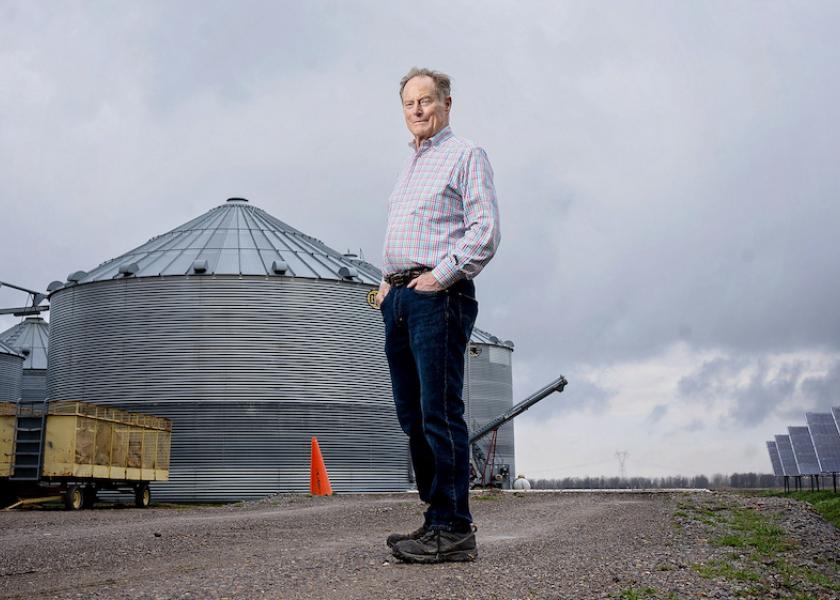
Any farmer can spot change after it arrives on a turnrow or property line, but few growers see change’s approach. Even rarer is the ability to recognize distant change forming in real time. Meet the hyper-vigilant Steve McKaskle—eyes fixed to the horizon.
McKaskle’s success story—or more aptly, his book of Job saga—is a chain of steep crests and troughs. Commodity busts, crippling tornados, incurable cancer, frontline dicamba wars, organic vs. GMO melees, scientific breakthroughs, value-added victories, and direct-marketing grand slams are chapters of an extraordinary farming life beyond the bounds of convention.
Races sometimes are won by those standing closest to hear the crack of the starting pistol, but McKaskle changed the calculus: He sought out the starter’s location before the shot was fired.
Bootheel Son
The Missouri Bootheel is a geographical orphan, with more akin to the Mississippi and Arkansas deltas than the Midwest bulk of its Show-Me-State parent. Southern accents, flat vistas, rice, and cotton are commonplace on Bootheel fields that boast some of the finest soils on the planet. Across 3,700 acres in Missouri and Arkansas, McKaskle helms a family operation centered on popcorn, rice, soybeans, and wheat.
At 4 a.m. each day, surrounded by level land, McKaskle stirs from bed, drains a cup of coffee, and departs his home outside the tiny community of Braggadocio, alongside his wife, Kaye, and drives 20 minutes west to Caruthersville on the Mississippi River for an hour of exercise to kickstart the day.
At 71, battling the shadow of multiple myeloma and the aftereffects of chemotherapy, McKaskle’s constitutional morning jog is slowed to a walk, but don’t expect complaint or dismay: The Pemiscot County farmer is a study in mettle.
Raised in a non-agriculture family, McKaskle met Kaye, the proverbial farmer’s daughter in high school, and the pair tied the knot several years later during McKaskle’s junior year at Ole Miss. Degree in hand, McKaskle headed for a future in law, until his father-in-law and seminal influence, Joe Bob Coppage, came calling in 1973: “Come home,” Coppage said. “Come home and farm.”
McKaskle listened to the row crop proposition with eyebrows raised. The boy from Caruthersville had never driven a tractor.
Scrape for Breakeven
“I couldn’t have been greener,” McKaskle says. “My father-in-law, who I loved dearly, talked us into coming back because there were no young people returning home to farm. I was 21 with no experience and 300 acres to work.”
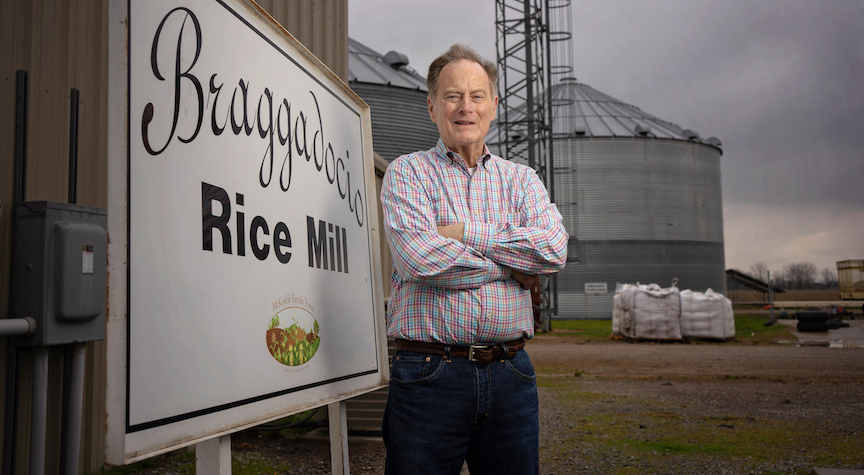
The first season was plagued by success. Commodity prices rose and cotton climbed to 35 cents per pound, an attractive price at the time. Bootheel farmers jumped at 35 cents and booked, but McKaskle was flat-footed and didn’t pull the trigger. However, by fall, cotton soared and McKaskle backed into a $1 per pound windfall, along with soybeans at an all-time high of $8.50. “It spoiled me and I thought this was going to be easy. What a mistake, because the 70s and 80s were about to get so ugly.”
With no irrigation, McKaskle spent the next seven years fighting anemic commodity prices and dismal yields, scraping for breakeven. And then came the hell of 1980, a crop season hot enough to make the devil sweat—no summer rain coupled with 115 F temps, followed by torrential fall downpours that knocked cotton to the ground.
McKaskle was forced to pivot. He obtained a commodity license, found work with Dean Witter in Memphis, moved his family to the big city, and split time between concrete and farm.
After six months at Dean Witter, McKaskle began gaining clients, but the increase in pay was devoid of satisfaction—his heart was in Braggadocio. “Farming had gotten into my blood. It was time to work on the farm or in the city—but not both. We chose the farm and went back home.”
Buck Per Pound
“You ever heard of organic cotton?” asked producer Johnny Burlison.
Seated in the stands of a Caruthersville high school basketball game in 1993, McKaskle answered in the negative, and Burlison dropped details: “Tomorrow, some company is going to be in Portageville (University of Missouri Fisher Delta Research Center) looking for farmers to grow organic cotton.”
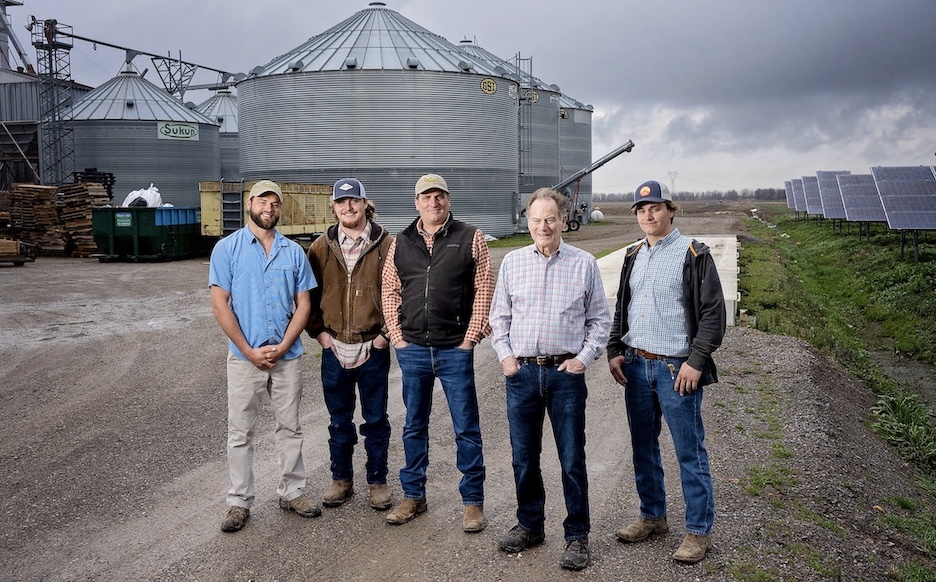
The next morning, McKaskle, as one of a handful of farmers in attendance, listened as California-based Esprit propositioned growers. The pitch details flew past McKaskle—save a key number: $1. “That was all I needed to know,” McKaskle says. “Cotton was 35-40 cents at the time and I was all in on a buck per pound.”
Prior to the age of USDA involvement in organic production, certification requirements were minimal—inspection was a handful of questions over a phone call. McKaskle sought organic guidance from University of Missouri Extension specialist Van Ayers, found fertilizer (turkey pellets) at a facility in Purdy, Mo., and started with 40 acres. “We went in blind, but the crop was decent and we got paid.”
McKaskle entered the organic cotton arena because he found a better and more stable price than what standard commodities offered, and as he added incremental acres and word spread across the farming community, McKaskle caught flak. By 1996, most growers were charging toward GMO cotton and soybeans with tanks of glyphosate. McKaskle’s operation was the polar opposite: “People thought I was crazy, but I knew the organic market was only starting to grow.”
As expected, weeds were often a major problem in McKaskle’s rows. However, with cultivation, chopping crews, and propane flames, he stayed on top of weeds, except in stretches when incessant rain triggered a mess. “Sometimes we had to replant, but all in all, we were having genuine success.”
Learning the ropes of organic cotton management, McKaskle began rotating organic soybeans, seeking a premium buyer. He attended a health goods conference and listened to a session keyed by a representative of Arrowhead Mills in Hereford, Texas—one of the few buyers of organic grains at the time. McKaskle introduced himself to the rep and tapped into a fledgling organic grain market.

Additionally, he offered cotton seed to organic dairies and met with incredible demand, demonstrated by a dairy buyer who drove from Idaho to purchase a single truckload. “From then on, that same guy wanted to buy every load we had.”
Further, McKaskle joined a sustainable cotton project in Fresno, Calif., and heard that Yvon Chouinard, the founder of Patagonia, was seeking organic cotton. Always at the ready, McKaskle offered his fiber and signed with Patagonia. (He later added Nike and Levi’s as customers.)
Pressing beyond standard organic cotton, McKaskle began contract growing 40 acres of colored cotton—green, brown, and chocolate. Word traveled fast in the Bootheel and passersby steadily pulled off I-55 to gooseneck at McKaskle’s odd field. The colored fiber picked well, but the contract buyer went belly-up and McKaskle warehoused the bales in Caruthersville. “It got crazy because they had a fire and we lost the cotton, but still we got paid insurance money for it.”
Following success in cotton and soybeans, the prescient McKaskle set sights on rice, predicting the organic rice industry was ripe for growth. Yet, no amount of foresight could predict the havoc of an EF4 tornado.
Birth of the Brand
On a Sunday afternoon, April 2, 2006, a devastating twister steamrolled McKaskle Family Farms, destroying all equipment, machinery, bins, gin, farmhouse, shop, barn, vehicles, planted crops, and much more. All gone. A memory. Life upended and the initial era of organic production finished—it was time to switch lanes.
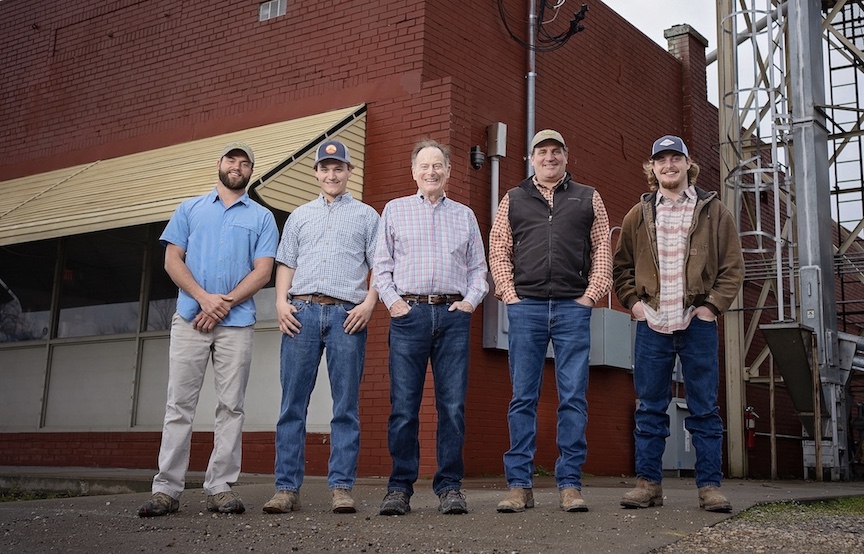
Emerging from the ordeal of a rebuild, McKaskle contracted with Specialty Rice in Brinkley, Ark., and planted 80 acres of organic grain. Further, he began investing (and encouraging landlords likewise) in grading and wells. Production exploded and Specialty Rice called for more product. McKaskle caught the organic rice wave, and popcorn was next in line. In a nutshell, his ground soon included 1,600 acres of rotating popcorn, rice, and soybeans.
In 2010 (third year of popcorn cultivation), after a buyer hauled away the last of McKaskle’s popcorn harvest, Kaye asked a simple question: “Do we have any popcorn left in the bin?”
McKaskle walked to the bin and filled a garbage bag with the last of the kernels. “We had never popped our own corn to taste it,” McKaskle says, with a deep chuckle. “We popped some and thought it was the best we’d ever had. I mean, it was really, really good.”
Kaye was two steps ahead of her husband: “Let’s put our name on it and sell it.”
The “Braggadocio” brand was born.
Pounding Pavement
Braggadocio Popcorn debuted in March 2010. McKaskle convinced his popcorn buyer to package a portion of the product in 2 lb. and 25 lb. bags. He put personalized stickers on the bags and hit grocery stores in the Memphis area to hawk his wares, often making cold visits with bags in hand. It was a grind with no guarantees, but his efforts paid off in spades.
As demand for Braggadocio Popcorn grew, McKaskle connected the dots to organic rice. “If we could do this with popcorn, I knew we could do it with rice,” he recalls.
Mirror image, Specialty Rice packaged some of McKaskle’s grain in 2 lb. bags, and he attached a sticker, and went door to door at grocery stores, including Whole Foods, undaunted by negative or neutral responses. “We got it going from nothing,” he says. “We went to Memphis maybe 15 times to talk to the Whole Foods manager, to convince him on our rice and popcorn.”
Nine months later, in December 2010, Whole Foods began stocking McKaskle Family Farms on its shelves. “I’ll never forget that day,” he remembers. “It was one of the most exciting days of my life.”
Body Blow
As always, McKaskle didn’t wait on opportunity. In 2012, hearing that a major burrito chain was opening a restaurant in Memphis, McKaskle and Kaye made a recon visit, noting huge pans of brown and white rice. While paying for the meal, McKaskle asked for the manager’s card, and followed up with a trip to the district office in Nashville—toting a 25 lb. sack of grain. He gained nada beyond the district’s low-level interest.
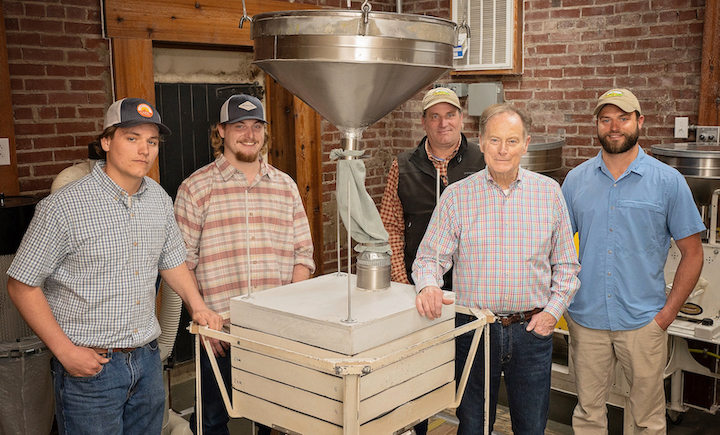
Try, try again. Scanning the speaker list on an advertorial for the Missouri Organics Association annual meeting in St. Louis, McKaskle noted a presentation by another district manager. McKaskle gathered grain samples, attended the show, and introduced himself after the manager spoke. The next week, McKaskle’s email popped with a message from the corporate sector.
Months later, in June, McKaskle and Kaye flew to Denver for a sit-down HQ meeting with the suits and ties of the big-time retail chain. “It lasted 15 minutes,” McKaskle says. “They were corporate and kept their cards down.”
Walking out of the presentation room, McKaskle was perplexed. “Kaye, you think they are interested?”
“I don’t know,” Kaye echoed. “I’m not sure.”
Two weeks later, the restaurant chain called McKaskle Family Farms: “How would you like to sell organic rice to us?”
The exchange exploded with growth—McKaskle Family Farms became the sole organic rice supplier to the heavyweight retail company. Yet, financial success was dwarfed by a creeping ailment: In May 2013, McKaskle was diagnosed with bladder cancer.
Shouldering the Burden
With a load too heavy to bear, McKaskle dialed his son-in-law, Carter Ellis—raised on a Mississippi County farm, but prospering in the groove of a career at Nucor Steel in Blytheville, Ark. “Carter, I need you to drive up to our place, tomorrow.”
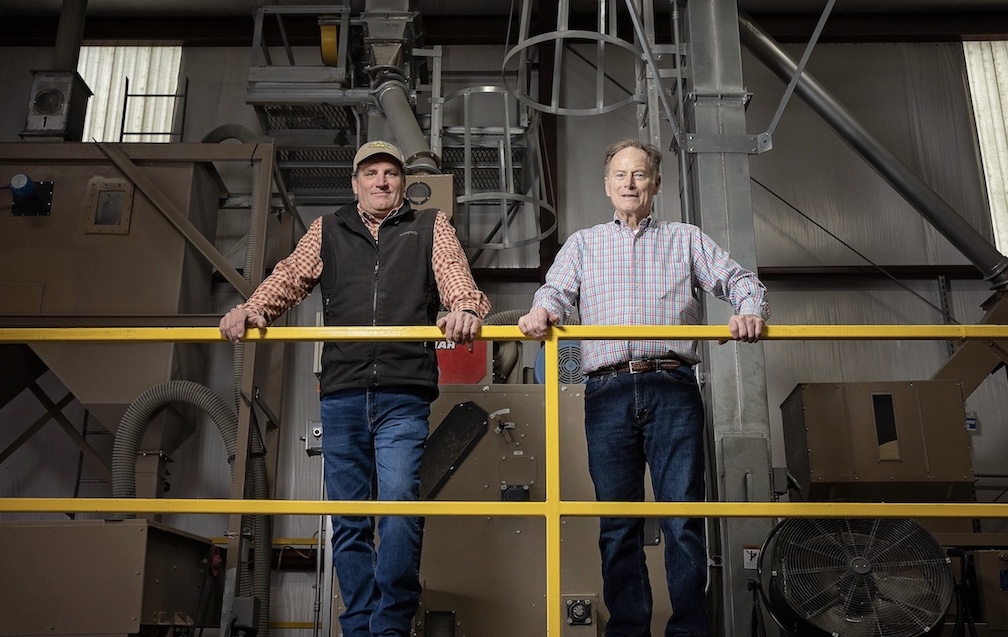
Face to face, the two men went detail by detail over the whole hog, ensuring Ellis understood the entire operation. “Carter was a godsend during a time of need and is now an incredible asset,” McKaskle says. (Ellis remains in an integral role and is COO of the McKaskle’s processing company, in addition to farming on the side. Ellis’ three sons, Stephen, Coppage, and Clinton currently farm the original ground worked by their grandfather, and the trio represents the seventh generation of the family operation.)
At Vanderbilt University Medical Center, surgeons removed McKaskle’s bladder and successfully improvised a new organ from a segment of his intestine. In late 2014, confident that surgery had excised all malignancy, McKaskle returned to Vanderbilt for a follow-up CT scan.
Indeed, bladder removal had excised the target cancer, but doctors delivered a follow-up body blow: The test results revealed a more sinister malignancy—multiple myeloma, cancer of the plasma cells. Bottom line, McKaskle was suffering from bone marrow cancer.
Chin up, despite the seismic shift in circumstance, McKaskle faced reality head-on, ready to fight. “There is no cure,” he says. “The cells play hide and seek, and it gets really tricky. You never know what life will throw at you, and complaint gets you nowhere.”
While shouldering the burden of cancer treatments, McKaskle continued to hone his business, building a 3,750 square-foot warehouse for a mill and a cold-storage building in 2015, geared toward direct marketing and value-added farming. Packaging of rice and popcorn products (flour, grits, polenta, and cornmeal) were done in-house, and a website was streamlined. Beyond Whole Foods, McKaskle developed business with United Natural Foods, KeHE, Hiland Naturals, and Blue Apron.
It was a stratospheric high point for a cancer-stricken Caruthersville farmer with no agricultural background prior to his third decade in life.
And it didn’t last. Once again, McKaskle was about to run the gauntlet.
Heavy Price
In April 2015, the major burrito chain announced an end to all GMO ingredients in its restaurants, on the heels of taking frequent swipes at modern farming, along with airing its Farmed and Dangerous streaming series and The Scarecrow animation.
McKaskle was a farmer filling a contract, but he was caught in the crossfire of a retailer versus the ag community at large. When his combine window was blown out by a rifle shot in the fall of 2015, the unsettling volley was a portent of far worse to come. Six months later, McKaskle brought the marketing operation to a screeching halt due to threats of machinery sabotage and grain adulteration. He halted production, took stringent mill cleaning measures, and bought an x-ray machine, all to the tune of $600,000-plus.
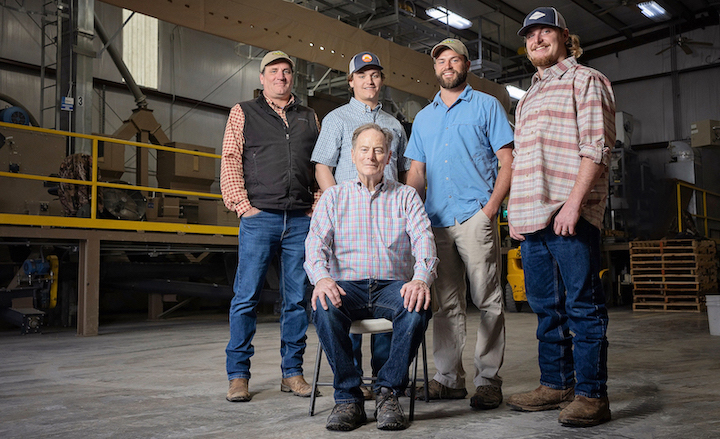
“The restaurant chain made a lot of people extremely angry by putting out cartoons running down GMOs and feedlots, and it had nothing to do with me,” McKaskle says, “but I paid a heavy price.”
Despite the financial drain, coupled with heavy emotional turmoil and the physical strain of cancer treatments, McKaskle braced for another jolt. Always attuned to agriculture’s horizon, McKaskle knew his organic ground was a sitting duck for the pending arrival of a new herbicide technology. He was about to be steamrolled by the dicamba wars.
Adios Organics
In 2016, dicamba-tolerant soybeans debuted. In the first two years following launch of the herbicide tech, McKaskle’s 2”-tall soybeans displayed cupping—telltale signs of dicamba movement. His beans survived, but with dicamba-tolerant acreage swelling, McKaskle predicted far worse damage for an island in an expanding sea. He was correct.
“By 2018, everyone growing almost any kind of soybeans was switching to dicamba-resistant beans, because otherwise your beans were going to get killed. For years, we had worked fine with glyphosate and neighboring farmers around us were very helpful, but dicamba was something different and put us in the dark because there’s no way to shield crops from something that volatizes and can move in from 15 miles away. I’d never experienced anything like it in my career.”
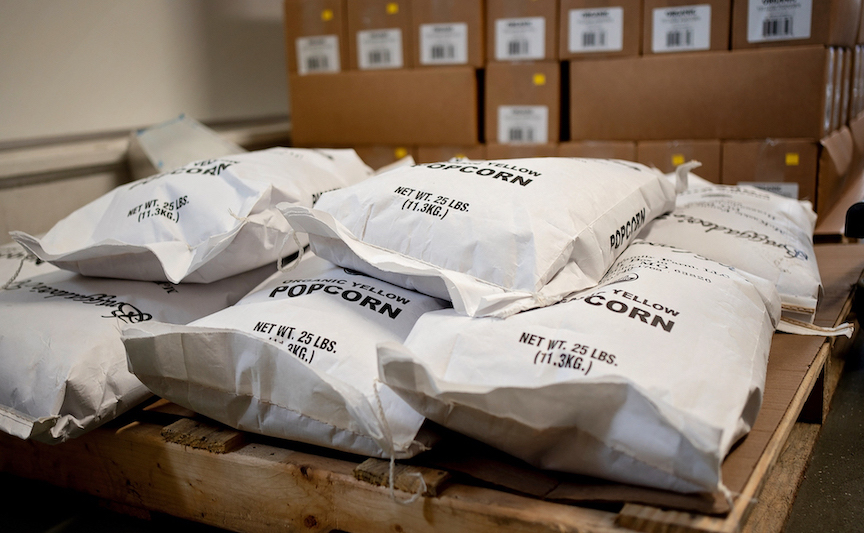
“In 2019-2020, we got hit by dicamba even worse. It was so terrible in 2020 that after three replants, the beans finally got to 1-2” and got hit again. For five weeks the beans didn’t grow, but the weeds sure did.” (McKaskle Family Farms joined a class action lawsuit against Bayer and the case remains in litigation.)
Compelled by circumstance to plant dicamba-tolerant soybeans in 2021, the year also marked McKaskle’s last season to grow organic rice or popcorn. “If you don’t have the three-crop rotation, you can’t control the weeds. After nearly 30 years, we could no longer farm organic crops.”
Studying a changing playing field, McKaskle searched for a brand beyond organics. Back to the drawing board.
Find’em
When the dicamba conflict erupted and McKaskle saw the potential for the loss of his organic acreage, he began searching for a new profit avenue. Specifically, he researched sustainable rice. “I read an article about Anheuser-Busch cutting water and fertilizer back 10% and getting applauded as sustainable. It’s almost laughable. If 10% was the bar, then I knew we could do much, much better and add value to our crop. I started coming up with a list of genuine sustainable practices to promote.”
In 2020, McKaskle’s preparation paid dividends. Nashville-based AgriCapture kicked off a carbon credit program and McKaskle was at the fore as a board member. “I got with the founder, John Farris, and showed him that land going to carbon credits, particularly with rice raised sustainably, should receive a premium.”
“Now we’re climate-friendly certified and monetizing our practices of minimum till or no till; furrow irrigation rice; water usage cut by 50%; and no burning of rice straw. The opportunities are always out there in farming, but they rarely arrive by chance. You have to go find’em.”
The Amazon Cometh?
And what does McKaskle see next in the tea leaves? The direct ability of crops to control weeds.
He is preparing patent pending allelopathic technology with stunning promise: “I believe we can make soybeans, corn, cotton, and rice control their own weeds through allelopathy. An allelopathic plant, by nature, emits biochemicals into soil via root systems and controls weeds—just like a black walnut tree or cereal rye.”
“A professor at Stanford University took a gene sequence from a Thailand rice variety that was mildly allelopathic and put in a tobacco plant. The tobacco plant had 10 times the weed control compared to the rice it came from. I have patent pending on a similar genetic modification.”
Additionally, the same sort of technology, McKaskle believes, eventually will fix nitrogen. “In the future, we’ll be able to get plants like cotton and corn to essentially make their own nitrogen. I think crops are going to become the next Amazon rain forest as far as controlling carbon in the atmosphere.”
Undaunted
In 2017, McKaskle underwent a stem cell transplant to combat multiple myeloma and started a nightly regimen of one chemo pill as a semi-permanent chaser. On April 1, 2022, McKaskle’s body rejected the chemo pill. He was forced to endure a weekly trip to Nashville for a new drug protocol with different chemotherapy, heavy steroids, and a shot in the stomach with a monoclonal antibody. As of 2023, his cancer is in remission.
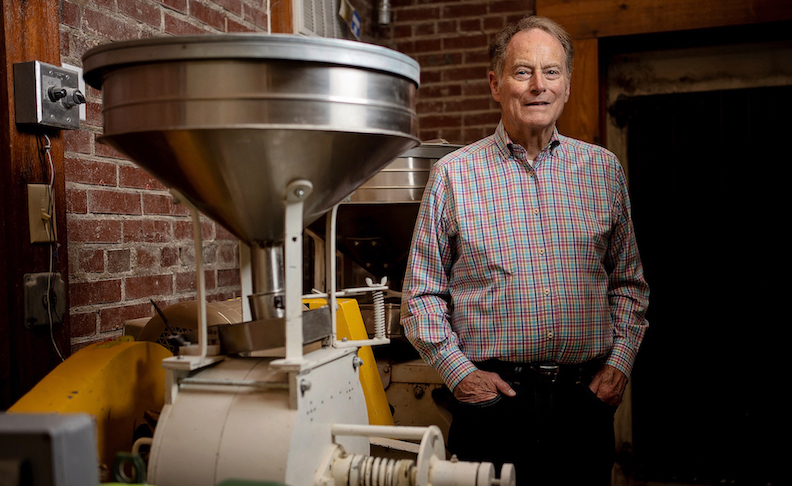
Navigating the highs and lows at every stage of his career, McKaskle cold-nosed the tiniest hints of potential economic opportunity for his farm, never waiting on chance. Undaunted at 71, McKaskle could retire with a fishing pole or sit on the proverbial porch. Instead, his inner fire burns all the hotter. “I’ve got so much still to learn about cover crops, chemical replacement, natural nitrogen fertilizers, and much, much more.”
Focused on tomorrow, a farmer with a vision—Steve McKaskle.
To read more stories from Chris Bennett (cbennett@farmjournal.com 662-592-1106) see:
Judas Goats: Agriculture’s Bizarre, Drug-Addicted Masters of Deceit Once Ruled the Killing Floor
Cottonmouth Farmer: The Insane Tale of a Buck-Wild Scheme to Corner the Snake Venom Market
Tractorcade: How an Epic Convoy and Legendary Farmer Army Shook Washington, D.C.
Bagging the Tomato King: The Insane Hunt for Agriculture’s Wildest Con Man
Young Farmer uses YouTube and Video Games to Buy $1.8M Land
While America Slept, China Stole the Farm
Bizarre Mystery of Mummified Coon Dog Solved After 40 Years
The Arrowhead whisperer: Stunning Indian Artifact Collection Found on Farmland
Fleecing the Farm: How a Fake Crop Fueled a Bizarre $25 Million Ag Scam
Skeleton In the Walls: Mysterious Arkansas Farmhouse Hides Civil War History
US Farming Loses the King of Combines
Ghost in the House: A Forgotten American Farming Tragedy
Rat Hunting with the Dogs of War, Farming's Greatest Show on Legs
Evil Grain: The Wild Tale of History’s Biggest Crop Insurance Scam


